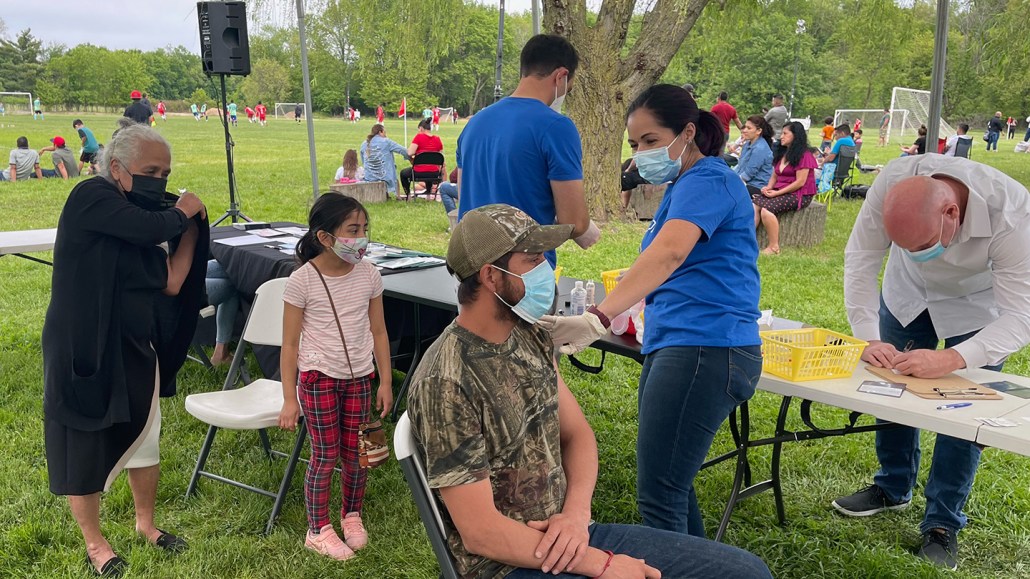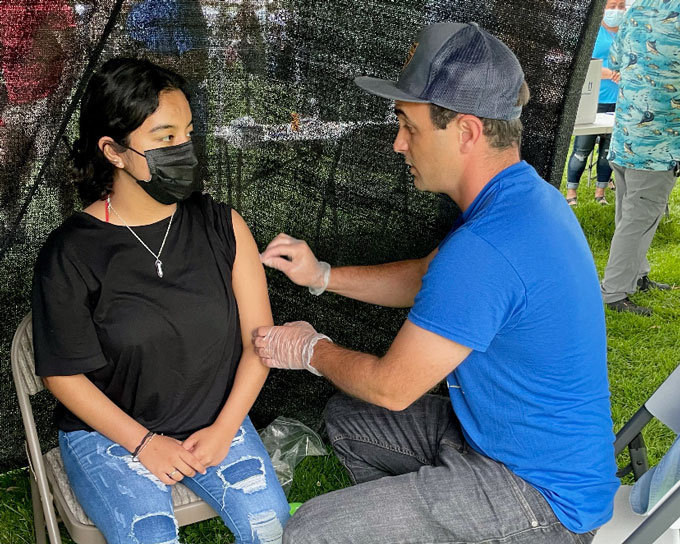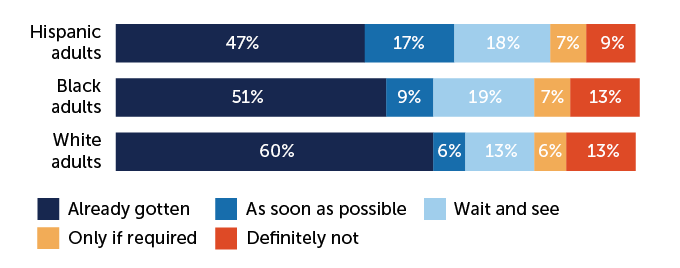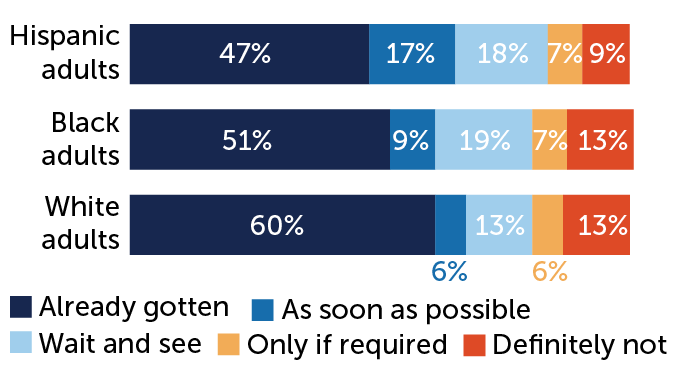How one medical team is bringing COVID-19 vaccines to hard-to-reach Hispanic communities
Unidos Contra COVID totes shots, empathy and facts to Philadelphia’s Spanish-speaking residents

Melissa Pluguez, a nurse and co-medical director of Unidos Contra COVID, gives a man the COVID-19 vaccine at a May outreach event organized around a community soccer game in the Philadelphia area.
José Hernández
- More than 2 years ago
PHILADELPHIA — In a makeshift tent behind a soccer goal and close enough to a taco stand that the smell of grilling barbacoa and carnitas drifts over, Melissa Pluguez cheerfully asks a man, in Spanish, if he’s right- or left-handed.
The man, wearing jeans and a red T-shirt with white letters that spell Abercrombie, answers right, and confesses he’s a bit afraid of needles. Even so, he’s been eager to get a COVID-19 vaccine, Pluguez translates, but hasn’t felt comfortable going to vaccination sites around Philadelphia. But when he heard about this vaccination event — staffed by local, Spanish-speaking medical professionals and held at his church congregation’s regular Sunday gathering — he felt ready.
Pluguez is a nurse practitioner for critical care at Cooper University Health Care in Camden, N.J., and co-medical director of Unidos Contra COVID, the small group that organized this vaccine outreach event. She tells the man that the fear is worse than the needle, and he nods and looks away as she injects the Pfizer vaccine into his left arm. Afterward, he smiles, and the two bump elbows before the man leaves to pick up his vaccination card.
There’s no free beer in sight, nor is anyone getting complimentary tickets to Phillies baseball games. Instead, roughly 300 people are clustered around soccer fields that border the church parking lot. The main event is a tournament, where professional-looking players in uniform square off as spectators cheer. On adjacent fields, children kick balls around or chase each other through the lines of people waiting to buy tacos or mango slices stuffed into plastic cups. Couples dance to upbeat music emanating from loudspeakers set up near Unidos Contra COVID’s tent. Inside, behind dark mesh netting partitions set up for privacy amid all that action, vaccines are being delivered into arm after arm.
In the end, this sort of targeted approach may be a more impactful way than the flashier, broader efforts, like beer giveaways and large cash prizes, to reach the roughly 35 percent of adults in the United States who haven’t yet gotten at least one COVID-19 vaccine dose. Such a hyperlocal focus, experts say, can address the idiosyncratic and complex array of reasons that people aren’t getting vaccinated, especially in often overlooked and underserved communities that have experienced higher rates of COVID-19 and relatively low numbers of vaccinations (SN: 5/3/21).
Like in other parts of the country, Hispanic communities in Philadelphia have been especially impacted by COVID-19. Throughout the pandemic, hospitalization rates for Hispanic people in the city who are 35 and older have been higher than for any other group, as have death rates for those 75 and older. And vaccinations have lagged; only 37 percent of the Hispanic population has received one dose, compared with 51 percent of white residents as of June 14.
A group of local doctors and nursed formed Unidos Contra COVID, which means United Against COVID, earlier this year to address these disparities. The Hispanic population in Philadelphia is diverse, and “our experiences and makeup is hardly monolithic,” says José Torradas, an emergency room physician and co-medical director of Unidos Contra COVID, who left his job earlier this year to focus on outreach full-time. People in this community aren’t getting the vaccine “for different reasons in different groups.”
Figuring out those reasons has become crucial to Unidos Contra COVID’s mission. The group has found that for Central American and Mexican communities in parts of Philadelphia, access has been the biggest problem. Meanwhile, in the predominantly Puerto Rican and Dominican communities of northern Philadelphia, Torradas says, vaccine skepticism stems from misinformation and a general distrust of the government.

Barriers to access
At the church event, Unidos Contra COVID came to bring vaccines to people who won’t travel to unfamiliar places to get them, because of language barriers or for fear of deportation. Many of the people gathered around the soccer fields are undocumented, Torradas says, though his group never asks about immigration status.
These Sunday gatherings represent the few hours each week that these communities come together, he says, often after church. “It’s a sanctuary, a place they feel safe.” For that reason, organizers asked that the church not be named.
The rest of the week, it’s either work or home for many undocumented people. “Anything outside of that routine represents a risk,” Torradas says. Even though local pharmacies may be close, or federal distribution sites accessible by bus, fears of interacting with government services or law enforcement keep many from getting vaccinated, he says. By law, undocumented immigrants are eligible to receive COVID-19 vaccines.
“There’s lots of desire [here] for the vaccine,” Torradas says. “They just don’t want to get deported.”
A Kaiser Family Foundation poll in May found that Hispanics who have yet to receive a COVID-19 vaccine are about twice as likely as non-Hispanic whites or Blacks to say they’d like to get vaccinated as soon as possible.
Shot status
Hispanic adults expressed a desire to get the COVID-19 vaccine “as soon as possible” at much higher rates than Black or white adults, according to a telephone survey of 2,097 adults conducted April 15 to April 29 by the Kaiser Family Foundation.
Intent to get a COVID-19 vaccine, by racial group


To best serve these communities, Unidos Contra COVID teams up with trusted figures in the area, like José Hernández. He’s a church leader who can identify times and places where the group could have the most impact, and who can spread the word among the community.
Speaking loudly to be heard over the music, Hernández says that he had been trying to connect members of the congregation with vaccines since they first became available. But most people weren’t willing to travel far to get the shots, even though they are free. And simply going to their doctor often isn’t an option, since Hispanic Americans also have the highest rates of uninsurance of any racial or ethnic group according to the U.S. Census Bureau.
Being able to get the vaccines at a regular community event, and from people who speak Spanish, “has just been incredible,” Hernández says. Besides two large events that Unidos Contra COVID has held at his church, Torradas and Pluguez have both come out to give shots to smaller groups.
“We’ve never had an experience like this … where doctors come to us,” Hernández says.
Fear of deportation and language issues aren’t the only barriers to vaccination in some of these communities. There’s also gun violence to worry about. In 2020, there were over 2,200 shootings in Philadelphia, among the highest number for any U.S. city. Walking or taking the bus even just a kilometer or two to a vaccine distribution site in some neighborhoods “might mean crossing two or three gang turfs,” Torradas says. Some people have told him they don’t feel comfortable leaving their own block.
To reach such communities, Torradas and his colleagues have set up shop in places like schools and shopping malls, operating on weekends and evenings, in addition to church events. Many of the people who come “are day laborers who leave [home] at 5 a.m. and don’t get back till late,” Pluguez says. And many “are not hesitant. They are just not able to access the resources.”
Addressing vaccine hesitancy
Still, there are people in these communities who are skeptical of vaccines, Pluguez says. Reasons range from general distrust of government, to fears that stem from misinformation, such as that the vaccine causes sterility.
Some of the concern “is truly borne of crimes that have been committed [against] both Black and Hispanic communities,” Pluguez says, citing official programs that resulted in up to a third of Puerto Rican women being sterilized from the 1930s to 1970s, often without informed consent. “So hearing now that this vaccine might make them sterile? That runs deep, it runs very deep.”
Another common, false rumor is that the vaccines contain microchips with location trackers. Such rumors, which spread quickly on social media, can easily take hold in communities with undocumented immigrants. “They don’t want to have to fear every day that something they just put in their bodies is going to make them prone to being deported,” Pluguez says.
To address that mistrust, Unidos Contra COVID tries to identify trusted members of the community who could act as effective messengers. People are more likely to listen “to a face they recognize, who has been around longer than the vaccine,” Torradas says.
Individuals personally impacted by COVID, especially younger people, are especially effective. “Bring me the most fit person in this congregation who almost died of COVID and have him and the medical professionals stand in front of everybody, tell their story and answer their questions. That’s the formula for hyperlocal buy in,” he says.
Unidos Contra COVID also canvasses nearby streets during their vaccination events, trying to meet people where they are. “The moment I start speaking Spanish, you can absolutely see their eyes light up, and they start engaging in a way that’s very different,” Pluguez says. From that kernel of trust, she listens to people’s concerns about vaccination “without putting blame on them,” she says.
When misinformation comes up, she addresses it practically. “[If people ask] ‘What if there’s a microchip?’ I say, ‘Come look at the vaccine for yourself. Look at the needle. Look at the vial. You can see that there is nothing in it,’” Pluguez says. Often she talks about her experience as an emergency room nurse during the worst of the pandemic. “I share with them how many hands I’ve held of the sick and dying, alone,” she says, and how the vaccine can prevent that from happening.
At a previous vaccine outreach event in south Philadelphia, Pluguez once spent 45 minutes talking with one man she encountered walking down the street with his pregnant wife and three young boys. “He’d heard a lot of the rumors,” she says, about microchips and sterility. Pluguez addressed those concerns in Spanish, while playing with his kids to keep them entertained so she and the man could talk more. Twice during their conversation, the man left, saying he’d think more about it. “He made it a block before coming back with more questions,” she says.
Pluguez pulled up a chair for him, and they continued talking. As the conversation went on, she noticed a shift in his demeanor. “He started looking directly at me and making jokes,” she says. “That’s when I got the feeling that he finally trusts me.”
Finally, the man expressed worry about missing work if he got sick from the vaccine, Pluguez remembers. So she asked him, “What if you get sick with COVID? What is your wife going to do if you’re laid up in the hospital? Who is going to pay the bills?” Ultimately, that message got through.
“Then he said, ‘As long as you stand by my side, I’ll do it.’ And I said, ‘I’ll be here with you every step of the way,’” she says. Pluguez stayed with him through vaccine registration, the shot and the 15-minute waiting period afterward.
“I was really proud of him … I had such joy in my heart,” Pluguez says.
“We’re no longer looking at the people who were desperate to get vaccinated,” she says. “Now every single person who shows up is a victory, is one step further into making COVID an issue of the past.”
Sign up for our newsletter
We summarize the week's scientific breakthroughs every Thursday.
Amid the food, music and soccer at that Sunday vaccination event, 151 people got their first or second vaccine dose. Since Unidos Contra COVID began their events in early May, the group has vaccinated about 850 people, and hopes to scale up.
Toward the end of the afternoon event, Pluguez pulled out thick UPS package. “Our official 501(c)(3) documents,” she says. “I promised José I wouldn’t open them until we could do it together.”
They expect to get approval from the Internal Revenue Service in a few weeks. Becoming an official nonprofit will help the group more easily apply directly for grant money, allowing it to purchase more freezers for vaccine storage and hire more full-time staff. Currently, about 50 people contribute to the effort as volunteers, with Pluguez and Torradas devoting the most time.
The two pose for a picture with the documents, celebrating the milestone. “I may shed a tear, I’m so excited,” she says. Then, Pluguez gathers her things to leave for the hospital. Before she goes, someone from the taco stand brings her a Styrofoam box filled with dinner.
“I’ve worked the past six nights; tonight is my last shift,” she says. “I get off at 7 a.m., then I can sleep.”







